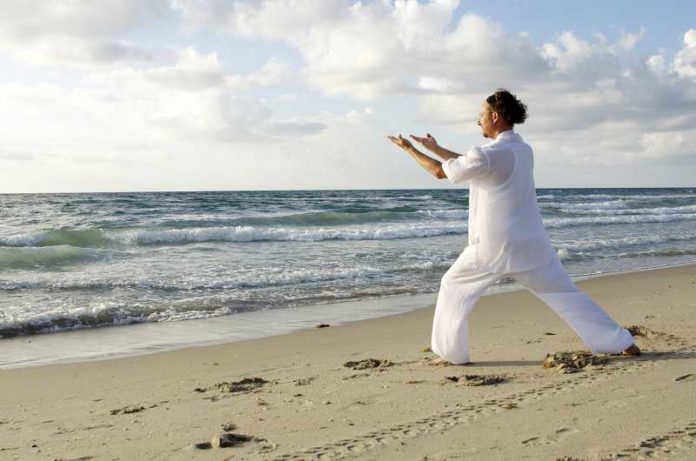A systematic review identifies evidence-based health benefits of tai chi for specific health conditions as well as for general health and fitness.
Tai chi is a gentle, slow-moving, meditative martial art that began in China thousands of years ago.
Many variations of tai chi exist, and new forms continue to develop, including shortened routines for the elderly.
Tai Chi is characterized by a series of gentle movements intended to strengthen and relax the body.
It focuses on the body’s position and sensations and uses images such as “waving hands like clouds” to learn the exercises.
Tai chi’s biomechanically efficient movements require little effort and its circular and flowing motions provide stretching and help the body and the mind relax.
Weight shifting between each foot and keeping the body in a flexed position during a tai chi routine improve balance and leg strength.
Tai chi’s rhythmic breathing may improve oxygenation.
A literature review recently published in Canadian Family Physician examined the health benefits of tai chi for 25 specific conditions as well as for general health and fitness.
Existing systematic reviews and recent clinical trials were organized into 5 different groups: evidence of benefit as excellent, good, fair or preliminary, or evidence of no direct benefit.
Researchers combed through 500 hundred clinical studies and 14 existing systematic reviews.
The findings were as follows:
– Excellent evidence of benefit: Preventing falls in older adults, osteoarthritis, Parkinson’s disease, chronic obstructive pulmonary disease (COPD), and cognitive functioning;
– Good evidence of benefit: Depression, cardiac rehabilitation, stroke rehabilitation, and dementia;
– Fair evidence of benefit: Quality of life for cancer patients, fibromyalgia, hypertension, and osteoporosis;
– Preliminary evidence of benefit: Stroke prevention, anxiety, low back pain, breast cancer surgery recovery patients, attention deficit disorder, spinal cord injury, traumatic brain injury, and postsurgical nasopharyngeal cancer patients;
– Evidence of no direct benefit: Type 2 diabetes, rheumatoid arthritis, and chronic heart failure;
– General health and fitness benefits: Tai chi appears to improve balance and aerobic capacity, may improve flexibility, and may improve lower limb strength, particularly in adults who have been deconditioned.
There is fair evidence that tai chi increases overall well-being and improves sleep.
There is very preliminary evidence that tai chi might improve kidney function and quality of life for dialysis patients.
The length of most trials ranged between 6 to 12 weeks, which may not be long enough to assess benefits for chronic conditions.
With so many styles, teachers, lengths, and frequencies of tai chi practices, the optimal tai chi practice has yet to be identified.
In addition to the specific health conditions examined, many people who practice tai chi describe benefits that have yet to be studied, such as improved digestion, warmer hands and feet, and feeling younger.
Patients often ask physicians to suggest therapies to help them achieve health goals or manage chronic conditions.
Understanding that tai chi is an active research topic, doctors can now make evidence-based recommendations to their clients.
Written By: Lynn Kim



